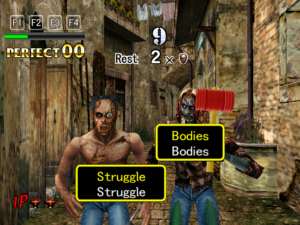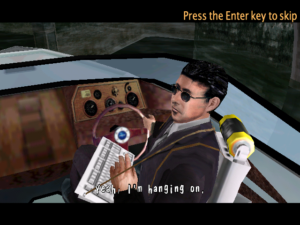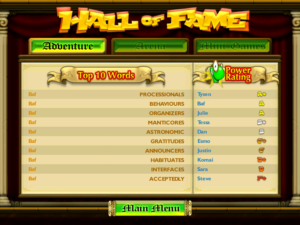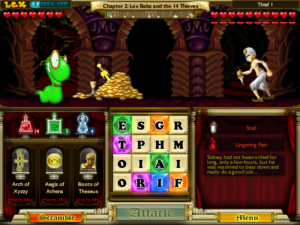Puzzle Quest: Comparisons
I started off this whole series of posts by comparing Puzzle Quest to Bookworm Adventures, and I’m not the only one to make that comparison. It’s a pretty obvious comparison to make, since they’re two of the only representatives of the Puzzle/RPG Fusion genre. But now that I’ve experienced them both more fully, when I look at them side by side, BA seems little more than a proof-of-concept, while PQ is a full-fledged game, as complete and complex as any RPG on the market. I’m probably being a little unfair to BA because of its length, but even taking that into account, PQ has a more involved system of stats, provides more freedom of action on the main board, and gives you more options during combat — which is a little strange, because I’d call the underlying tile-matching mechanic weaker in that respect than BA‘s word-making. It seems to me that the main reason for this is PQ‘s decision to make both sides use the same board. BA had the computer opponent not act on the board at all — instead, it just hit at you and did damage. This meant that your actions on the board didn’t affect what the opponent could do, which put limits on the kinds of tactics that the game could support.
I also compared Puzzle Quest to strategy games such as Heroes of Might and Magic. It turns out that there’s a closer connection than I suspected: PQ officially takes place in the same campaign setting as the Warlords series (hence its subtitle, “Challenge of the Warlords”). I’ve played a couple of the Warlords games, long ago, but I’m basically not familiar enough with their trivia to recognize the names of its gods and kingdoms and so forth; apparently to a real Warlords fan, the connection would be obvious the moment the game said “Bartonia” or “Lord Bane”. Anyway, Warlords is basically the thing that Heroes of Might and Magic stole most of its ideas from, including the whole business of besieging cities, and running around to collect regularly-replenished resources. So now we have a direct reason for those elements to be present in PQ.
One final comparison. There is at least one blatant PQ imitation on the market: BattleJewels, a game written primarily for those few handheld platforms too geeky for PQ to run on (such as PalmOS and GP2X). Except that apparently it’s not an imitation: according to the developer, Stephen Bickham, it was in development for years before PQ was announced, and his real inspiration was Magic: the Gathering, so the massive similarity is just coincidental. Well, I’ve already noted how PQ has some M:tG-like aspects, so that part is believable. And there are some significant gameplay differences: BJ by default doesn’t refill empty slots, and it doesn’t have the whole campaign scenario and map treatment (being more geared towards PvP). To me, the campaign is a large part of the charm of the game, so I don’t feel compelled to plunge into BJ‘s context-free fights. In their basics, though, the two games are amazingly similar, even down to the choice of skulls for the damage tiles. But I’m not saying Bickham ripped off PQ, like many others have. For one thing, for all I know maybe PQ is the rip-off, and for another, there’s been such a general exhaustion of the possible variations on match-3 in recent years that it’s inevitable that some would be used more than once. Anyway, you can compare them for yourself, as both games have downloadable demos. PQ‘s has limited content, BJ‘s is nagware.
 Comments(0)
Comments(0)


